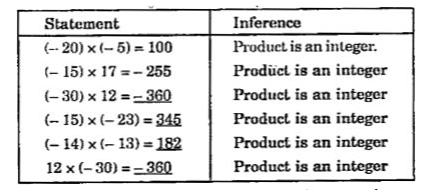Complete Solutions to QUESTIONS of chapter INTEGERS of Class 7 book with complete answers and questions
| Class 7 | MATHS |
| Chapter | INTEGERS |
| NAND LAL PUBLICATION | QUESTIONS |
| Number Of Questions | 21 |
| Academic Year | 2023-24 |
Following are some pairs of integers .Observe the following table and complete it .
`"Statement" " ""Obervation"`
(i) `17 +23 =40 " " "Result is an integer"`
(ii) `-10+3=... " " ......................`
(iii) `(-75)+18= ...... " " .......`
(iv) `19 +(-25)=-6 " " "Result is an integer"`
(v) `27+(-27)=..... " " ............ `
(vi) `(-20)+0=...... " ".............`
(vii) `(-35)+(-10)=........ " " .........`
What do you observe ? Is the sum of two intergers always an integer? Did you find a pair of integers whose sum is not an integer ?
View SolutionWhat happens when we subtract an interger from another integer ? Can we say that the difference is also an integer ? Observe the following table and complete it .
`"Statement" " " "Observation"`
(i) `7-9=-2 " " "Result is an interger"`
(ii) `17-(-21)=....... " " ...............`
(iii) `(-8)-(-14)=6 " " "Result is an integer"`.
(iv) `(-21)-(-10)=...... " " ..............`
(v) `32 -(-17)=..... " " ............`
(vi) `(-18)-(-18)=.... " "...............`
(vii) `(-29)-0=...... " " ...............`
What do you observe ? Is there any pair of integer whose difference is not an integer ? Can we say integers are close under subtraction ?
View SolutionWe know that `3+5=5+3=8` that is the whole numbers can be added in any order . In other words , addition is commutative for whole numbers
Can we say the same fot integers also ? We have `5+(-6)=(-6)+5`
Are the following equal ?
(i) `(-8)+(-9)and(-9)+(-8)`
(ii) `(-23)+32and32+(-23)`
(iii) `(-45)+0and0+(-45)`
Try this with five other pairs of inegers .Do you find any pairs of intergers for which the sums are different when the order is changed ?
View SolutionLet us try with five other pairs of integers .
`2+(-4)and(-4)+2`
View SolutionLet us try with five other pairs of intergers .
`(-5)+(-10)and(-10)+(-5)`
View SolutionLet us try with five other pairs of intergers .
`37+16and16+37`
View SolutionLet us try with five other pairs of integers .
`(-12)+18and18+(-12)`
View SolutionLet us try with five other pairs of integers . `(-100)+(-200)and(-200)+(-100)`
View SolutionIf a , b and c are three integers then
`a+(b+c)=(a+b)+c`
i.e addition is associative for integers Consider -3,1,-7 (-3)+[1+(-7)]=-3+…..=……
`([(-3)+1]+(-7)=-2+………..=…….
Is (--3)+[1+(-7)` same as `[(-3)+1]+(-7)` ? Take 5 more such examples . You will not find nay example for which the sums are different .
View SolutionLet us take five more such examples to verify Associativity.
`(-1)+[(-2)+(-3)]and[(-1)+(-2)]+(-3)`
View SolutionLet us take five more such examples to verify Associativity.
`(-5)+[(-15)+10]and[(-5)+(-15)]+10`
View SolutionLet us take five more such examples to verify Associativity.
`[(-8)+(-2)]+11and(-8)+[(-2)+11]`
View SolutionLet us take five more such examples to verify Associativity.
`[10+20]+(-30)and10+[20+(-30)]`
View SolutionLet us take five more such examples to verify Associativity.
`[5+7]+9and 5+[7+9]`
View SolutionWhen we add zero to any whole number we get the same whole number Zero is called the additive identity for whole numbers .Is it an additive identity again for integers also Observe the following and fill in the blanks
(i) (-8)+0=-8
(ii) 0+(-8)=-8
(iii) (-23) +0=
(iv) 0+(-37)=-37
(v) 0+(-59)=...
(vi) 0+...=-43
(vii) -61 +....=-43
(vii) -61 +...=-61
(viii) ..+0= .....
The above examples shows that zero is an additive identity for integers . you can verify it by a adding zero to any other five integers . In general , for any integer a ,
a+0=0+a=a
View SolutionCan you find the product `(-3)xx(-2)` ?
View SolutionCan you find the product `(-3)xx(-2)` ? Observe the following `-3xx4 " " =- 12`
`-3xx3 " " =-9 " " =-12-(-3)`
`-3xx2 " " =6 " " =-9-(-3)`
`-3xx1 " " =-3 " " =-6-(-3)`
`-3xx0 " " = 0 " " =- 3-(-3)`
`-3xx-1 " " = 0 - (-3) " " = 0 + 3 = 3`
`-3xx-2 " " = 3 - (-3) " " =3+3=6`
Do you see any pattern ? Observe how the product changes Based on this observation , complete the following :
`-3xx-4=`......
View SolutionNow observe these products and fill in the blanks
`-4xx4 " " =-16`
`-4xx3 " " =-12 " " =-16+4`
`-4xx2 " " =....... " " =-12+4`
`-4xx2=` .........
`-4xx1=`.......
`-4xx0=` ......
`-4xx(-1)=`..........
`-4xx(-2)=`..........
`-4xx(-3)=`.........
View SolutionWhat is the product of first five negative negative integers ? So , what will be the product of first six negative integers ?
View SolutionObserve the following table and complete it .

What do you observe ? Can you find a pair of integer whose product not an integer?
View SolutionWe know that multiplicatio is commutative for whole numbers : Can we say multiplication is also commutative for integers ?
View Solution
QUESTIONS questions and complete solutions for chapter INTEGERS of NAND LAL PUBLICATION of Class 7
All Exercises from NAND LAL PUBLICATION Class 7 MATHS INTEGERS
- ADDITIONAL QUESTIONS FOR PRACTICE (Long Answer Type Questions)
- ADDITIONAL QUESTIONS FOR PRACTICE (Objective Type Questions :
- ADDITIONAL QUESTIONS FOR PRACTICE (Short Answer Type Questions)
- EXERCISE 1.1
- EXERCISE 1.2
- EXERCISE 1.3
- EXERCISE 1.4
- QUESTIONS
- SAMPLE PAPER FOR PRACTICE
- Think ,Discuss and Write
- TRY THESE